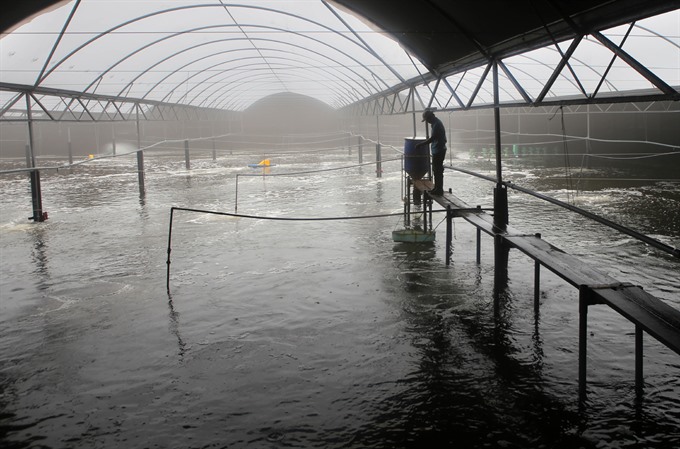.jpg) Environment
Environment

Masses of dead fish were found in central Quảng Trị Province’s communes of Triệu Vân, Triệu An, and Gio Hà, as well as in Cửa Việt Township late last month.
 |
| A glasshouse fish farming model in the central province of Thừa Thiên-Huế. — VNA/VNS Photo Hồ Cầu |
HÀ NỘI — Masses of dead fish were found in central Quảng Trị Province’s communes of Triệu Vân, Triệu An, and Gio Hà, as well as in
According to a report by the province’s Department of Agriculture and Rural Development, the fish deaths are suspected to have been caused by explosives. Fisherman have reportedly been throwing explosive devices into the water to kill the fish, but the boats were unable to collect them all, leaving the remaining fish to wash ashore.
The problem of harmful and unnatural fishing methods is not solely one of
Lê Văn Lợi, a fisherman from Triệu Phong District in
Lợi said that the trawlers would catch all kinds of fish, big or small, and would carried nets of other fishermen along their ways.
In a single month, 30 fishermen in Triệu Lăng Commune of Triệu Phong District lost their fishing nets, and one had his vessel sunk. All of this was due to the trawlers, he said.
A similar situation is reportedly unfolding in the provinces of Nghệ An, Hà Tĩnh and Thừa Thiên - Huế.
Vice Chairman of the Nghệ An Province Fishery Subdepartment Trần Đăng Tuấn said that many farmers in the region had been using electric nets for fishing to add to their income.
Trương Viết Phương, a fisherman in Tam Giang Lagoon, Thừa Thiên –
“Fish stocks are decreasing in recent years. Fishing vessels use electric pulse nets to catch fish, no fish, big or small, can survive under such a method,” he said.
“I’m afraid there will be no more fish in Tam Giang Lagoon in the future,” he said.
Phạm Ngọc Đài from the Hà Tĩnh Fishery Subdepartment, said that such methods will seriously affect the sustainable development of fisheries in the area.
“Fishermen are destroying their own future,” he said.
In March alone, Quảng Bình discovered seven fishing vessels violating fishing rules, and seized 15 electric pulse fishing kits.
The Việt Nam Fishery Association recently announced that in the past five years, 83 species of fish have disappeared from Việt
Solution
Chairman of the People’s Committee of Phú Diên Commune, Thừa Thiên – Huế Province Phạm Tăng Đoàn said that fishing vessels using illegal fishing methods mostly operate at night, making it difficult for authorities to catch them.
“When we are able to reach them, they have already cut off the electric net or they flee the scene. Even if we do catch them in the act, the fine imposed is low compared to the profits they make,” he said.
Trần Đăng Tuấn from Hà Tĩnh Province said alongside an educational campaign and stricter punishments, supporting policies for offshore fishing vessels should be encouraged.
Offshore fishing is expensive, as fishermen need to invest in a vessel, and equipment. As such most illegal fishing happens onshore. Supporting locals to fish offshore could ease the burden of onshore fishing as well as reduce illegal onshore fishing. --VNS